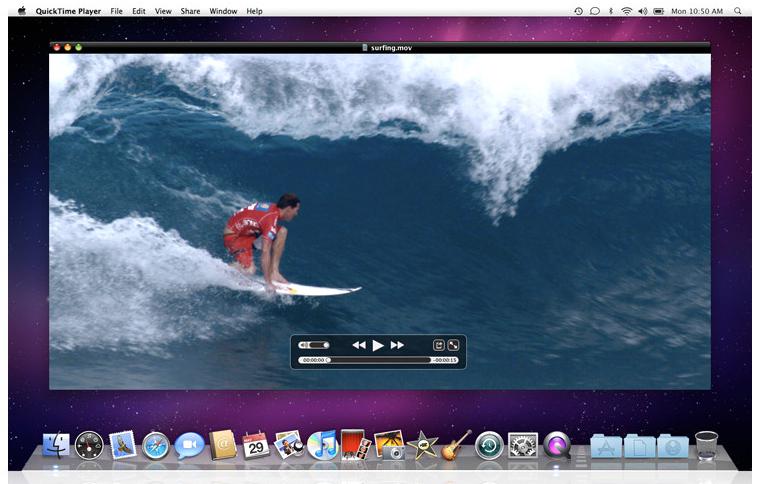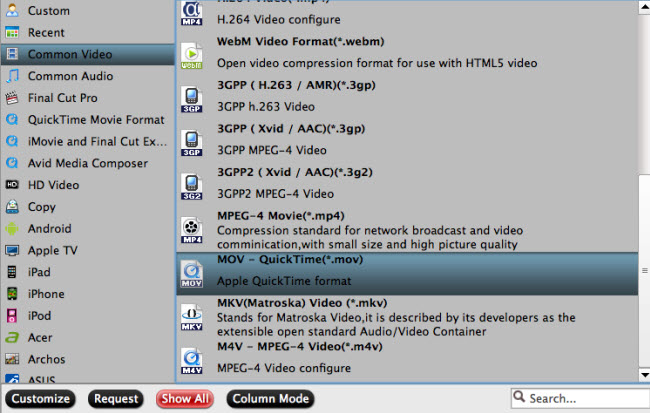The QuickTime player version 10 can create, play, edit and share many media formats, including many that are no longer in common use. If you are using OS X Mavericks and later, you can also use QuickTime player to convert certain old formats that it doesn't play back directly. After upgrading to the new Mac OS X operating system, a lot of people have problem to play AVI files on QuickTime player 10, others complain that it takes long hours to convert AVI into MOV files for playing with QuickTime 10.

Solution to play AVI files on QuickTime Player 10
To get AVI files played on QuickTime Player 10, some people suggest to download and install QuickTime 7 on your Mac, which can work with some older media formats. However, it only supports to deal with Motion JPEG only AVI files formats. Others recommend to install Perian, a free, open source QuickTime components which supports many different AVI media types including AVI, Divx, Xvid, etc. The problem is that the latest version of Perian 1.2.3 of Perian is not compatible with Mac OS X Mavericks (10.9), Mountain Lion (10.8) and Lion (10.7). Therefore, it is not strange that some people reflects that they can't even play AVI files on QuickTime player even with Perian installed.
Best way to watch any AVI files with QuickTime Player 10 on Mac
If you find no better way to get AVI files played on QuickTime Player 10, then you might as well perform a codec transcoding process. If you are looking for a powerful Mac conversion program with fast convesion speed and perfect output quality, you are recommended to download Pavtube Video Converter for Mac (review), the program works well on both Mac OS X El Capitan and macOS Sierra, it has full support for AVI container file formats encoded with various different video and audio codec. It supports batch conversion mode, so that you can swiftly load multiple AVI files into the program and then generate QuickTime Player 10 readable file formats such as QuickTime MOV, MPEG-4, MPEG-2 (OS X Lion or later), MPEG-1, DV, etc.
To get the best output video and audio quality, you can use the program's built-in profile settings options to flexibly adjust the output video codec, bit rate, frame rate, resolution and audio codec, bit rate, sample rate and channels to let them fit with QuickTime best playback profile settings displayed in below table:
Video Codec Settings |
H.264, Photo-JPEG |
|
Audio Codec Settings |
AAC, IMA 4:1 |
|
Resolution |
Media Resolution Quality: H264 (640x480) |
|
Frame Rate |
Use a frame rate of 10 fps or 15 fps |
|
Bit Rate |
2-5 Mbps and 196 kbps, stereo |
Apart from AVI files, you can also use this program to convert other unsupported file formats such as MP4, WMV, MKV, H.265/HEVC, XAVC/XAVC S, MOV, FLV, MXF, VOB, etc for QuickTime playback.
How to Play Any AVI Files with QuickTime Player 10 on Mac?
Step 1: Input Files into the program.
Start the program on your Mac computer, click "File" > "Add Video/Audio" or "Add from folder" to load AVI video files into the program.

Step 2: Specify output file format.
Click "Format" bar, from its drop-down list, define "MOV - QuickTime (*.mov)" as the output profile format.

Step 3: Adjust output profile settings.
Click "Settings" on the main interface to open "Profile Settings" window, here you can flexibly tweak the output video codec as H.264, audio codec as AAC, video resolution as 1280x720, video frame rate as 10fps or 15fps, video bit rate 2-5 Mbps and audio bit rate as 196 kbps.
Step 4: Start the conversion process.
After all the setting is completed, hit right-bottom "Convert" button to begin the conversion from AVI to QuickTime supported video and audio formats, codec and profile settings.
Useful Tips
- MOV to M4V: How to Convert MOV to M4V on Mac OS (macOS High Sierra Included)
- How to Play AVI Videos on MacBook(Air, Pro, iMac)?
- How to Import Android Videos to iMovie for Editing?
- How to Play a WMV File on Mac Computer
- Play H.265 Files with QuickTime Player on Mac
- Convert YouTube to MPG/MPEG with Easiest Way


 Home
Home

 Free Trial Video Converter for Mac
Free Trial Video Converter for Mac





